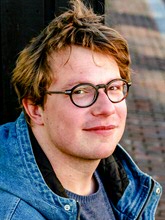The return of minority authors

Minority authors are increasingly joining in the societal debates around borders, culture, and identity. These discussions tend to be strongly polarized between national identity on the one hand and cosmopolitan universalism on the other. Minority authors point to a different pathway through such debates, as shown in the research of Jesse van Amelsvoort, who will defend his PhD thesis, A Europe of Connections, at the University of Groningen/Campus Fryslân on Thursday 18 November.
The eighteenth and nineteenth centuries were dominated by the nation state, a state with a single dominant nation and accompanying identity. This created a collective foundation underlying individual identity. Towards the end of the twentieth century, this began to change, as globalization ushered in a different and more individualistic approach to identity formation and experience. This shift not only made room for cross-border labour and mobility but also for transnational group formation, language mixing, and affective relationships that took less and less notice of the nation state.
The effects of these developments are broadly apparent. While large companies are recruiting international staff and holidays abroad are cheaper than ever, the rise of populist parties, Brexit, and Donald Trump’s election reveal the unwavering appeal of national identity.
Unimpressed by globalization
Van Amelsvoort’s thesis centres on six authors from five different countries: Hafid Bouazza, Najat El Hachmi, Tsjêbbe Hettinga, Emine Sevgi Özdamar, Zadie Smith, and Kjell Westö. These authors all write in more or less dominant European languages, and a comparison of their work repeatedly exposes the deep impact of the nation state. As minority authors, they are at the heart of the shift from the nation state to a globalized world, and they fail to identify with the traditional notion of the nation. At the same time, while feeling the pull of wider global connections, they remain unimpressed by globalization’s promises.
Conversations about Tsjêbbe Hettinga
‘You can see this very clearly in the work of someone like Tsjêbbe Hettinga,’ says Van Amelsvoort. ‘His poetry, for example, reveals a clear sense of kinship with islands and harbours: in New York, the Caribbean, Istanbul … In the poem “De stêd” [The City], Leeuwarden is placed at the centre of a circle connecting Iceland, the Spanish Cádiz, and Lahti, just north of Helsinki. He links Fryslân to these specific places, and not to others. You sometimes hear it said that people are “citizens of the world”, but in my thesis I suggest that “citizens of a world” might be more accurate. No one feels at home everywhere.’
Publishing company Bornmeer recently published Loft en lân. Gesprekken over Tsjêbbe Hettinga [Sky and Land. Conversations with Tsjêbbe Hettinga], in which Van Amelsvoort compiled the conversations he had in the context of his PhD research with Hettinga’s family, friends, and colleagues.
About Jesse van Amelsvoort
Jesse van Amelsvoort (1992) was born in Groningen. He studied Literary Studies, Philosophy, and European Studies in Utrecht, London, Göttingen, and Groningen before being appointed lecturer in the department of International Relations and International Organization and the department of Minorities and Multilingualism at the University of Groningen. In September 2017, he began work on his PhD thesis at the University of Groningen/Campus Fryslân. Van Amelsvoort currently teaches Modern European Literature and Culture at the University of Amsterdam.
Jesse van Amelsvoort will defend his PhD thesis, A Europe of Connections: Post-National Worlds in Contemporary Minority Literature, on 18 November from 2 to 3.30 p.m. at the Leeuwarden City Hall.
More news
-
15 September 2025
Successful visit to the UG by Rector of Institut Teknologi Bandung
